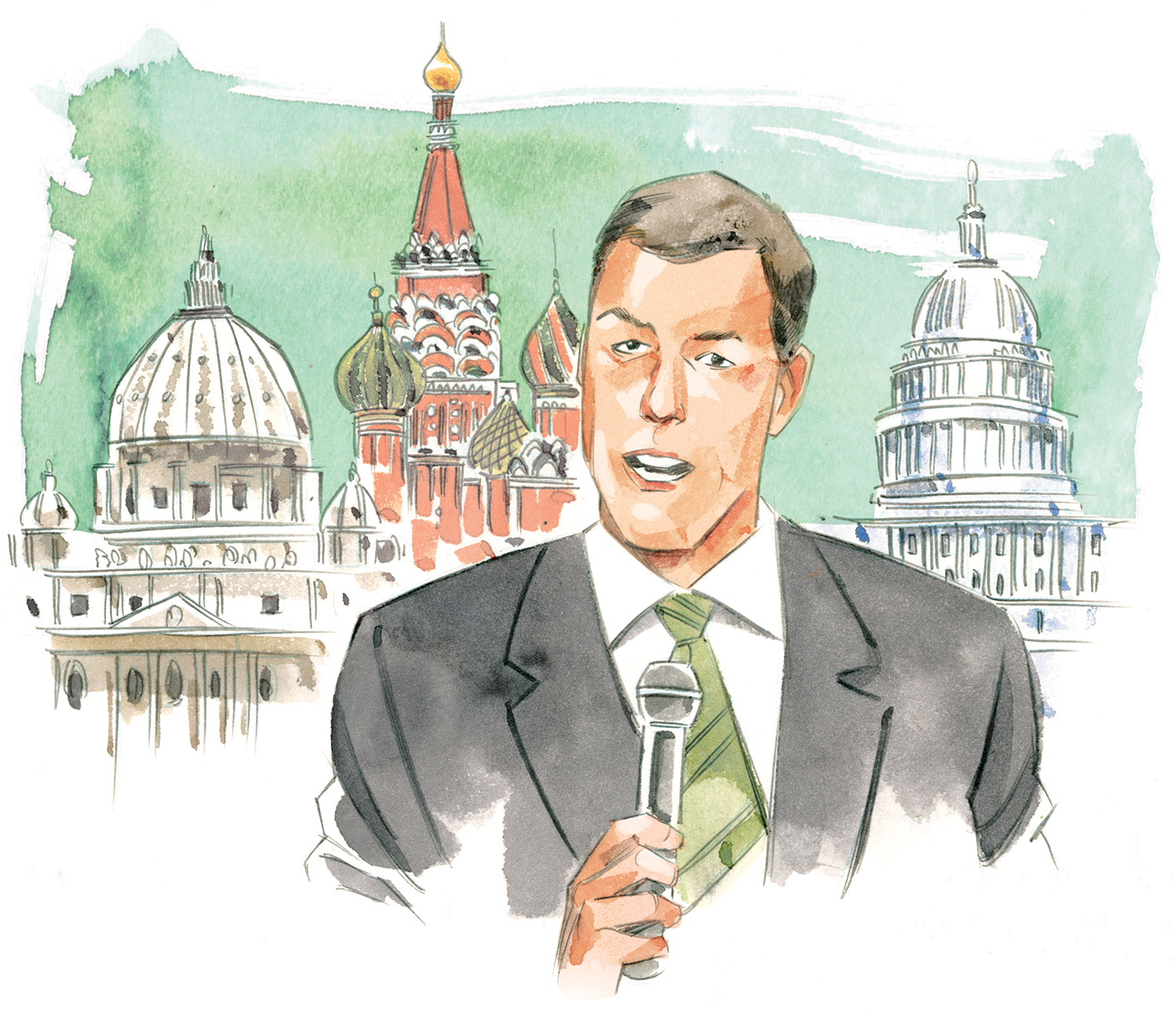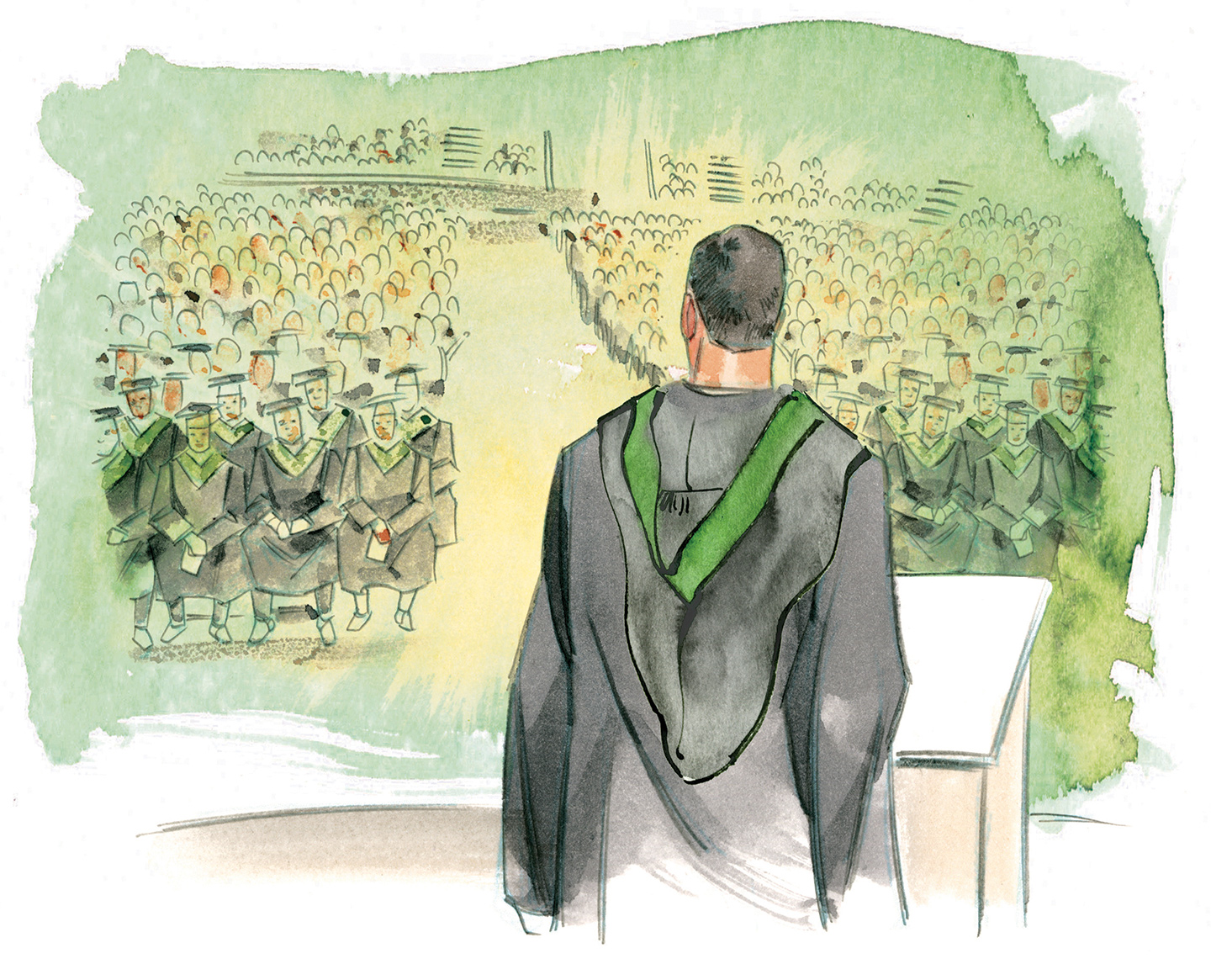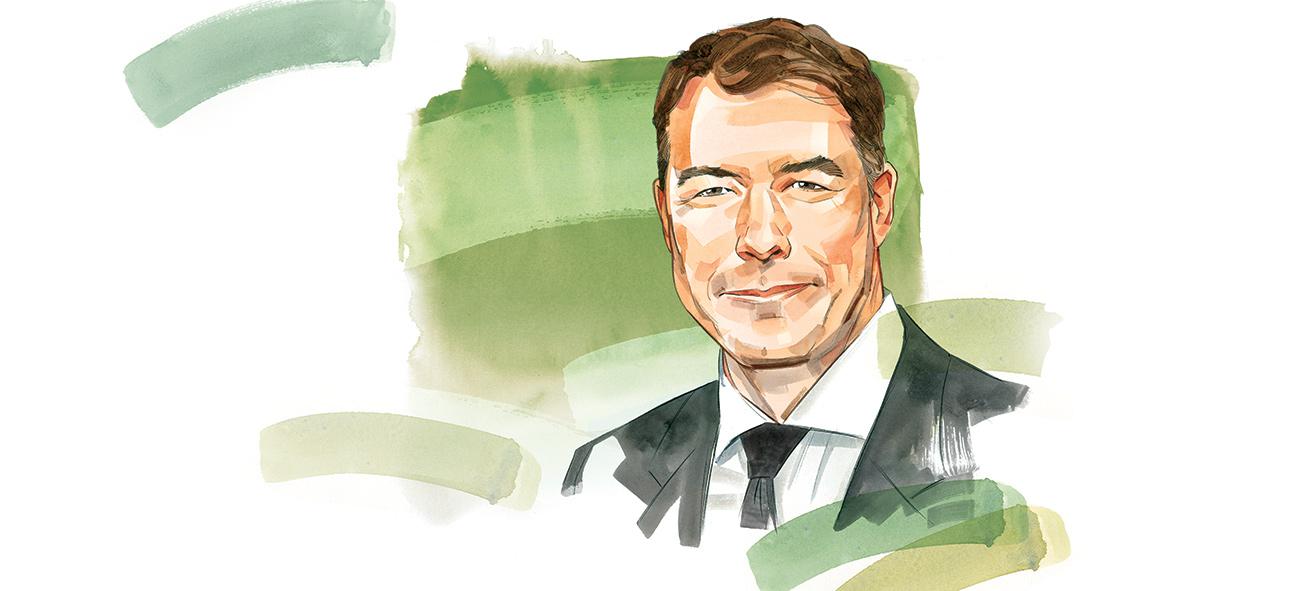The bundle of newspapers sat on the street, waiting for him to get home from school. Whether it was in Kingston, The Pas, Westlock, or any of the other small town map dots where he lived during his youth, the routine was the same.
He arrived, unbundled the papers and set out on his route. Going door-to-door, he delivered the news to his community.

Once finished, he raced home with his own copy of the paper and read it cover-to-cover, lingering on the sports page to catch up with his beloved Edmonton Oilers. In the evening, he and his older brother, Scott, listened to the radio or watched the TV news, discussing the events of the day – the attempted assassination of President Reagan, the explosion of the space shuttle Challenger, the theatrics of national political conventions and more. He consumed as much news as he could.
The news presented him with an understanding of the world and a shared sense of facts. And to Troy Reeb, facts matter. A lot.
Fast forward approximately 40 years, and that kid who delivered the news to his neighbours is one of the most powerful executives in Canadian media – delivering the news to an entire country.
In late April, Reeb (Communication Arts 1988) returned to his alma mater, Lethbridge College, to receive an honorary degree for his contributions to his industry, community and the college.
In a speech to peers, family and college supporters on the evening before Convocation, Reeb – ever the consummate news professional – focused his message on how we could all benefit from being a little more rooted in facts.
“Troy is one of those people who's always argued on all levels about the importance of having independent journalists,” says Quinn Ohler (Communication Arts 2009), a news anchor and reporter with Global Edmonton. “Fighting for facts and fighting for the ability to tell the stories that we need to tell is something that's always been really important to him.”
Reeb is Executive Vice President, Broadcast Networks for Corus Entertainment, a recent promotion that recognizes 31 years of experience at all levels of the television and news industry. He now oversees an empire of properties, including Global Television and its 15 local stations across Canada, 37 specialty channels including brands such as W, Showcase, HGTV, Food and History, 39 radio stations and all of Corus’ online platforms and apps.
Gone are the days of a whole town receiving the same news at the same time from the paper carrier. Consumers now get information from an endless choice of outlets. Factor in “fake news” accusations launched at journalists and the prevalence of actual fake news on the internet, and Reeb’s industry is facing unprecedented challenges. But his belief in facts drives him forward.
“As much as I worry about journalism,” says Reeb. “I am confident that journalism has a strong place in our future.”
It frustrates him that journalists have to spend time refuting obvious “fake news,” and he worries about the financial sustainability of journalism when traditional advertising-supported news delivery models have been “torn down.”
“Anybody can get music without news, they can get classified ads or auto reviews without news, they can get Netflix programs without news,” he says, noting that those types of content used to help subsidize the journalism that was packaged with it.
“That's actually a bigger concern to me – how does journalism stay sustainable in that world?” But Reeb finds optimism in a new, hungry generation of journalists who bring a variety of skills and fresh ideas to the industry.
“The asking salaries for real journalists have been steadily going up,” Reeb says. “They’re people who want to go out and research and tell stories and can do so in a multi-platform way – good writers who have a great way of presenting content so they can speak clearly and well online, on television and on radio.
Meanwhile, there's been a steady decline in salaries for people who just want to see themselves on TV. And I think that's good for journalism.”
“He was really energetic, had a tremendous voice and was a very colourful, very outspoken guy. I think it was kind of destined that he was going to wind up in broadcasting.”
{ Veryl Todd }
Long before he was running a news company, Reeb was a young, hungry journalist himself.
His family moved to Westlock – a small town about an hour north of Edmonton – in 1983, when Reeb was in Grade 9. His father, Jim, was a United Church minister; his mother, Donna, was a nurse; and his brother, Scott, went on to study political science at the University of Alberta.
Troy was an accomplished student who graduated high school at 16. His love of the news led him to journalism school and his academics gave him options. He considered Ryerson University in Toronto, NAIT in Edmonton and Lethbridge College.
“I really liked living in Westlock, living in small town Alberta. And that’s what brought me to Lethbridge,” Reeb remembers. “It was a small school, and I think that was important for my parents because I was really young. My best friend through high school was coming here to take Culinary Arts, and we decided this is a place where we both could get the programs that we wanted, be in a small environment that was less expensive than having to go to the big city, and I think quite importantly for both of us – it was still a long way away from Westlock,” he laughs.
At just 16, he immediately stood out in instructor Veryl Todd’s Communication Arts classroom. “He was really energetic, had a tremendous voice and was a very colourful, very outspoken guy,” remembers Todd. “I think it was kind of destined that he was going to wind up in broadcasting.”
Todd used to bug Reeb about his short pants as the student literally grew up before his eyes. “I actually grew more than six inches in the time I was in school,” says Reeb with a smile.
His skills also grew to match his height and booming voice. “He was a natural at reading and a natural at getting it to sound exciting,” says Todd. “And he had a flair for writing.”
Reeb’s first work in the industry came during summers at his hometown radio station in Westlock, CFOK. After graduation, he took a job in Yorkton, Sask., and one of his defining characteristics ensured he would always be in demand.
“He heads off down the road and he was no sooner out of there before I had two other calls,” remembers Todd. “This guy from Saskatoon called and said, ‘where's the kid with the big voice?’ I said, ‘oh, he's gone.’ And somebody else wanted him, ‘where's the kid with the big voice?’ I said, ‘you just missed him!’”
From Yorkton to Brandon, Man., to Windsor, Ont., Reeb earned a reputation as a reporter with a knack for telling compelling stories. “I was aggressive,” Reeb says. “I was a very ambitious storyteller. And I think that lent itself to some of the stories I told. I pushed hard to get extra, sexy details that would sell the story and make sure it would get on air.”
Reeb’s perseverance led to his first management opportunity at CJCD Yellowknife. The station manager wasn’t aware of just how young his new news director was until he went to pick him up at the airport. “The place is empty and I see this gentleman with gray hair who keeps looking around and looking right through me every time he looks my way,” Reeb recalls.
“Finally I walked over to say, ‘Charles?’ and he's like, ‘yeah?’ Then all of a sudden there's a spark of recognition. ‘Are you Troy? Oh, OK. Yes, yes, come with me.’"
Reeb grins at the memory. “His wife told me a year later, ‘that day he picked you up, he came home and goes, 'Oh my God, I think I've hired Doogie Howser!’”
“As much as I worry about journalism, I am confident that journalism has a strong place in our future.”
{ Troy Reeb }

Again, facts are important to Reeb, and the facts of this story are that while his rise seemed – and in many ways was – meteoric, it wasn’t without speedbumps.
“While a picture may speak a thousand words, it doesn’t always speak the truth,” Reeb told more than 750 Lethbridge College convocates while receiving his honorary degree at the Enmax Centre in April. He warned the graduating class to guard against the pressures and expectations that come in a world dominated by social media – where personal stories and self-images are filtered, moulded and twisted to be flawless, void of any hint of imperfection.
Reeb says experience taught him there is no such thing as a perfect life. “Two years after graduating from here, I’d already moved up three times and thought I was pretty hot stuff, until I got fired,” he told the convocates. “When I was being promoted to a network executive, I was also going through a divorce. And after spending most of my 20s and 30s acting like I was invincible, at 42, I was diagnosed with bladder cancer.”
Those kinds of facts are often omitted when telling one’s life story. Accomplishments are easy to amplify. Failures and discouragements are frequently swept under the rug. Reeb’s new job in Yellowknife only became possible because he was fired from a much larger radio station in Windsor. In the Northwest Territories, Reeb continued to learn important lessons in dealing with adversity.
In 1992, a bitter labour dispute at the Giant gold mine was driving a wedge through the city, eventually resulting in a bombing that killed nine. “This community, which I had grown to love in two years there, suddenly became very polarized and very divided and we were attempting to cover that story,” Reeb recalls.
As a 22-year-old news director, Reeb was in the newsroom when a report came across the police scanner of shots being fired on the picket line. He called a dispatcher to confirm the report then rushed to report the story, which caused panic in the union hall.
There were no gunshots – just a bus backfiring. His reporter on the scene paid a price for the mistake. “He ended up being kind of attacked, pushed to the ground, shoved and really kind of roughed up by some of the picketers,” says Reeb.
Shaken by the incident, Reeb shortly thereafter decided to leave Yellowknife. “It was a real learning lesson for me to not only get the story fast, but to get it right. Because there are real consequences.”
He landed in Saskatoon, and his career took off from there. Reeb went on to become a national correspondent with stints on both Parliament Hill in Ottawa and at the White House in Washington, D.C. He traveled the globe, reporting from locations such as the Vatican and the Kremlin.
He still had the big voice, but now had the experience, confidence and reporting skills to distinguish himself as one of Canada’s greatest news minds. “When you first saw him on the air, saw what he was doing in Washington with that bureau, you just knew he was a born leader and a star on the rise,” says Lisa Ford Clewes (Communication Arts 1984), the long-time news director at Global Saskatoon. Reeb carved a niche as a reporter able to tell “slice of life” stories that connected with viewers and drove home the importance of big-picture issues. “I used to call them stories that actually aren't that important, but will piss a lot of people off,” he laughs.
“I think the mistake of some journalistic organizations, the CBC sometimes, is that they try to focus so much on preaching the big important stories that they lose connection with the audience. And as much as you're preaching, nobody's listening.”
Those sensibilities led him to the top of the Global News chain. Under his watch, Global News earned countless awards, including becoming the first Canadian network to win the Edward R. Murrow Award for Overall Excellence in journalism in 2013 and the first Murrow Award for Innovation in 2017.
“What I'm most impressed with is he never lost his ground, he always stayed grounded,” says Ford Clewes. “He was the same kind and empathetic person from when he first started out with Global to when he became the leader of the entire news division.
Those are things that are very difficult to accomplish in a big leadership position, because you're making tough decisions every day.”
“He was the same kind and empathetic person from when he first started out with Global to when he became the leader of the entire news division.”
{ Lisa Ford Clewes }
“While a picture may speak a thousand words, it doesn’t always speak the truth.”
{ Troy Reeb }


As a means to staying “grounded,” Reeb remains closely tied to his roots. He’s a frequent visitor to Lethbridge College, where he spends time with students and faculty. He’s taken an active role in furthering the careers of students. Since 2006, Reeb has paid annually for a Lethbridge College student to work with Corus and Global teams in Toronto and Ottawa, earning indispensable major market experience. Fourteen students have completed the internship.
“He's one of those people who, despite his position in this company, I feel like I could call up and ask about my own career and things that I need to work on,” says Ohler, who won the internship in 2009. “To have that with someone who is that high up in the company is invaluable for someone like me.”
His association with the college is just one example of how Reeb has given back to those who helped him. In 2011, he was diagnosed with bladder cancer. Early detection and a quick reaction by his doctors allowed him to fully recover, but he immediately took up the fight for others in the same situation.
He is now one of Bladder Cancer Canada’s largest fundraisers and earned the organization’s highest honour in 2016. Reeb also recently joined the board of Stand Up to Cancer Canada, which brings together major musical acts and Hollywood celebrities to help raise millions for cancer research.
Reeb commits time to several boards and organizations, including Journalists for Human Rights – a Canadian group that trains journalists to report on human rights and governance issues in their communities. He completed his Convocation speech with a story that helped to shape his outlook on life.
While reporting in an impoverished area of Ethiopia, Reeb says a man invited him into his family’s hut, “and through a translator this man, who, by our standards, had nothing to give, spoke to me five words.”
Reeb asked the class to remember them as he has all these years. “’What can I offer you?’”

Thirty-one years after he crossed the stage himself, Reeb allowed himself a rare moment of reflection as he addressed this year’s convocation class. “The more you lift others up, the higher you yourself can go,” he tells a sea of faces who are about to begin their own career journeys.
April was a momentous month for Reeb. Shortly after being named Lethbridge College’s honorary degree recipient, the Radio, Television, Digital News Association (RTDNA) of Canada presented him with a lifetime achievement award. RTDNA President Fiona Conway called him, “a news leader who represents the best of what we strive for in Canadian journalism. Troy has been a champion and leader throughout his career.”
Reeb admits these honours feel like a mixed blessing – he’s quick to remind people his career is not winding down. He’s actually jumping into a brand new challenge. “In my new role, I still have news in my world, but I've relinquished having any editorial control,” he explains. “I am now a steward of the business, but not of the content.”
Today, Reeb can be found purchasing and commissioning shows for Corus’ wide network of television stations or discussing music mixes for the group’s radio stations. He’s just as likely to be chatting with celebrities like Bryan Beaumler or Chef Lynn Crawford as he is with the world’s top newsmakers.
He’s come a long way from the days of delivering newspapers in Westlock, or learning about the news business at Lethbridge College before he was old enough to vote. “Kids like him made it worth it,” says Todd, of his 22-year teaching career. “Because he really made something of himself.”
A power broker who can hold his own in Toronto’s largest boardrooms, Reeb still holds on to the values he learned as a small-town prairie kid. “It's a super fun business, and in the end, the job is just as it was when I worked at CFOK, part time, over summers when I was going to college,” Reeb says. “It's not about reaching the whole country – it’s about reaching you – in a city, in a small town, in a neighbourhood.”
He’s still thinking like the paperboy that he once was – delivering a sense of community, one home at a time.
The Troy Reeb Internship
Fourteen Lethbridge College students have taken part in the Troy Reeb Internship program, earning invaluable major market experience. “I don't know where I would be today if it wasn't for that internship,” says Quinn Ohler, who grew up in a small rural farm community and was the fourth winner of the internship. “It gave me the confidence to know that I could work in a major market, I could – if I worked hard and still had the passion that I had – be able to fill in for Global National or anchor a newscast in a market like Edmonton.” Many past winners have gone on to successful media and communications careers.
• 2006 – Callista Mason
• 2007 – Heather Crowe
• 2008 – Dan Grummett
• 2009 – Quinn Ohler
• 2010 – Sarah Scott
• 2011 – Kirsty Allen
• 2012 – Gabrielle Marchand
• 2013 – Stefanie Dunn
• 2014 – Taylor Oseen
• 2015 – Katelyn Wilson
• 2016 – Meagan Williams
• 2017 – Stephanie Savage
• 2018 – December Burgess
• 2019 – Skylar Peters



